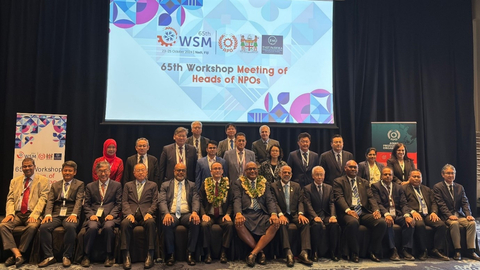Nadi, Fiji:
From 23 to 25 October, the Asian Productivity Organization (APO) convened its 65th Workshop Meeting (WSM) of Heads of National Productivity Organizations (NPOs) in Nadi, Fiji. Hosted by the Government of Fiji, this annual event gathered 51 NPO Heads and advisers from 19 APO members to outline the future of sustainable productivity in the region, with a focus on Green Productivity (GP) and artificial intelligence (AI).
This press release features multimedia. View the full release here: https://www.businesswire.com/news/home/20241027975213/en/

(Photo: Business Wire)
The inaugural session was honored by the presence of Fiji’s Deputy Prime Minister Manoa Seru Nakausabaria Kamikamica, who emphasized the unique challenges island nations face in balancing economic growth with urgent climate action. He remarked, “As islanders whose way of life is directly threatened by the increasingly harsh impacts of climate change, the people of Fiji keenly feel the dual pressures of pursuing economic growth while mitigating the negative impacts of climate change.”
A highlight of this workshop was the launch of the APO Green Productivity 2.0: The Road Ahead report. Professor Yoichiro Matsumoto, Science and Technology Advisor to Japan’s Ministry of Foreign Affairs (MOFA) and member of the APO GP Advisory (GPA) Council, presented the evolution of the GP concept since its inception by the APO in 1994. The report offers a forward-thinking roadmap for governments, businesses, and individuals to adopt GP 2.0 strategies, merging productivity with environmental responsibility. Presentations from experts, including Dr. Chin-Hsu Lin, Chair, Technical Working Group on GP 2.0, and representatives from the Korea Development Institute (KDI) and MOFA Japan, emphasized how integrating GP and AI can foster sustainable growth in the region.
At the Welcome Dinner hosted by APO Chair 2024–25 and Director for Fiji Jone Maritino Nemani, the President of Fiji, H.E. Ratu Wiliame Maivalili Katonivere, delivered a keynote speech. He called for greater international cooperation to combat climate change and emphasized the role of GP in driving sustainable development. “Together, let’s harness the power of productivity to protect our planet,” he urged, reinforcing Fiji’s dedication to global environmental leadership. In addition, APO Chair Nemani accepted the invitation from GPA Council Chair Prof. Ryoichi Yamamoto, which was extended on his behalf by Prof. Matsumoto, to join the APO GPA Council. This reflects Fiji’s commitment to advancing regional sustainability initiatives.
The WSM also featured a strategic planning session where NPO Heads discussed program plans for 2025 and 2026. These plans focus on supporting APO members in leveraging GP and AI to address pressing productivity challenges and shaping the organization’s strategic transition post-Vision 2025.
As the region faces ongoing global challenges, the 65th WSM reinforced the APO’s leadership in driving socioeconomic growth and strengthening the collective resolve of member economies to champion sustainable development for a greener, more prosperous future.
About the APO
The Asian Productivity Organization (APO) is a regional intergovernmental organization dedicated to improving productivity in the Asia-Pacific region through mutual cooperation. It is nonpolitical, nonprofit, and nondiscriminatory. Established in 1961 with eight founding members, the APO currently comprises 21 member economies: Bangladesh; Cambodia; the Republic of China; Fiji; Hong Kong; India; Indonesia; Islamic Republic of Iran; Japan; the Republic of Korea; Lao PDR; Malaysia; Mongolia; Nepal; Pakistan; the Philippines; Singapore; Sri Lanka; Thailand; Turkiye; and Vietnam.
The APO is shaping the future of the region by fostering the socioeconomic development of its members through national policy advisory services, acting as a think tank, institutional capacity-building initiatives, and knowledge sharing to increase productivity.
View source version on businesswire.com: https://www.businesswire.com/news/home/20241027975213/en/
![]()









